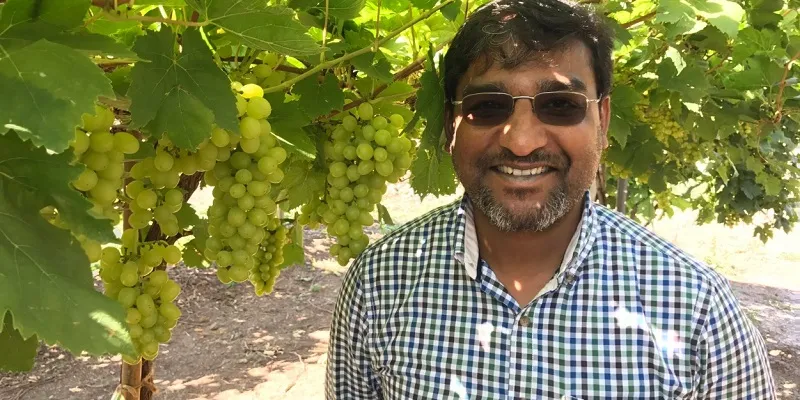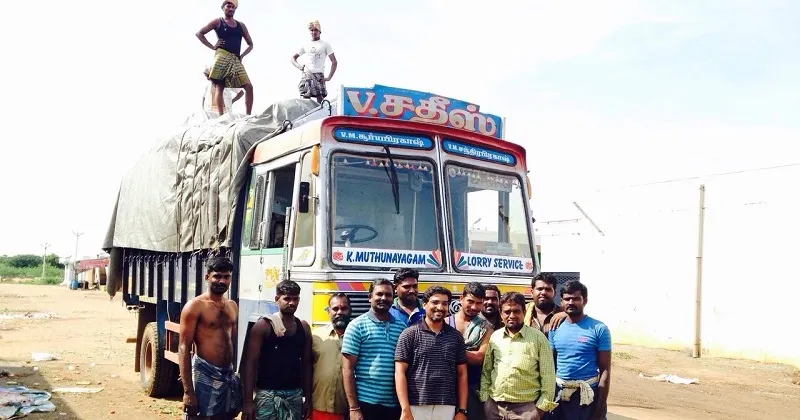Want to learn how to scale up farming, here is Ben Raja's story of 'Farm Again'
Ben Raja and Raj Kancham left the corporate life, aggregated 2,500 acres under the Farm Again brand, and are using a direct procurement/sale strategy, technology intervention and a unique pricing model to grow their business.
Ice cream brand Ben & Jerry’s changed the way the US consumed the frozen dessert because of the way they took on the big names in the industry. The David versus Goliath story resonated well with the American audience.
In India, we have Ben and Raj taking on the conventional wisdom of farming.
They have - over the last five years - converted 2,500 acres of land into organic farms and have created traceability of the product to the very farm the produce was picked out of.
So the next time you buy watermelons, onions or tomatoes at a Reliance Retail, Big Bazaar or More, you can scan a code on the vegetable bag. The map will point you to a farm managed by Farm Again, the company founded by Ben Raja and supported by his close friend and associate Raj Kancham.
The 30-member company, which has made an investment of Rs 8 crore, has revenues of close to a million dollars now. Over 1,000 farmers have signed up and the startup aims to add 13,000 more next year.

End-to-end solutions
“India’s farms are built on a local-for-local model for generations. It cannot be like the West where food is imported and unified across retail chains,” says Ben Raja, the founder of Farm Again. He adds that the company is an end-to-end farm solutions company, where technology and traditional farming knowledge are combined to increase yields for farmers.
Raj Kancham, head of operations at Farm Again, says: “Farmers have always lacked information, they are sold chemicals by traders and gain knowledge from farming fairs or what the traders sell them.”
Raj adds that their company decided to change all that by providing streamlined information, planning the farm, getting buyers, and giving them market prices.
If you enter a Farm Again field, an IOT device gives out information on the moisture content and soil conditions. It also regulates a network of pipes controlling water and fertiliser inputs.
The data is analysed by the Farm Again team and the farmer is guided through the day.
In the beginning
Ben almost dropped out of college in 1992 when he was 17 years old. He sold computers for a living and made a lot of money in those days. “But under the pressure of knowing that my family would not like it, I went back to engineering college,” he says.
Raj , on the other hand, came from a family of scientists, was exposed to computing when young, and was always building things with early computer languages. Since he had the ability to develop on Java he was recruited into a startup in 1999 and subsequently worked for several large corporates. It was in Honeywell that Ben made his name and continued his love for hardware and software.
Raj spent 20 years in the corporate world before Ben, who he knew from Honeywell, convinced him to join Farm Again in 2015.
“Ben has already put in three years and he had invested a lot of time, effort and finances on the project. I realised that his project was the most transparent and path breaking,” Raj says. He says the project was path breaking because technology and knowledge were tapped to work with farmers rather than just offering them insights.
Raj had earlier worked for Nokia Market Light, which had nine million farmers subscribing to call and SMS-based knowledge of crop prices. Since he had a background in farming knowledge and building systems, Ben roped in Raj.
Too many stumbling blocks
But why did Ben get into farming?
“I visited my childhood friend who was a gold medalist in school and had taken to farming. When I met him I realised he was in poverty because his farm yields had dropped and he never understood the dynamics of market pricing,” Ben says.
Ben visited the region of Salem, Tamil Nadu, where his friend's farms were and realised that his friend had not failed.
“My friend did not know how to react to lack of water and dropping yields after investing in chemical fertilisers. Agriculture has too many stumbling blocks because of the lack of information,” Ben says.
This was in 2010. He immediately began to roll out a farming company and quit his job in 2012. He founded Farm Again in the same year. He started in Tirunalveli, his hometown, where he experimented with some farm hands. He worked in a few acres, growing different crops; watermelon was one of them.
“I followed the book, but I used organic material and used water sparingly thanks to the technology I built,” Ben says.
His watermelon yield was five times more than the average; he got 12 tons per acre. In India, the average is 2 tons per acre while in the west it averages about 40 tons per acre.
The news spread word of mouth and a lot of farmers came to Ben. Slowly, farmers across the region began to take interest in Ben’s methods.
Ben built 180 devices on his own and shared them with farmers. He also built a visualisation engine with the hardware manufactured in Coimbatore.
“This isn't hard work. You just manage your time efficiently,” Ben says.

Tapping technology
“If you look at Israel and how they manage water, it is very efficient. In India, we are drilling bore well after bore well. We need to use technology seriously in agriculture,” he says.
Ben sunk in Rs 8 crore, of his own money, in total and has created a farming collective across Tamil Nadu, Maharashtra and Karnataka.
“I have not yet made my money back. People in Tirunalveli think I have left a corporate life for farming. But what I am building is a large system of farms using technology to increase yields,” Ben Raja says.
He intends to create a branded push-cart retail system to supply vegetables and fruits to major cities, and is also planning a stream of supplies to local stores.
“People complicate agriculture. It just requires fresh thinking. Agriculture needs a revolution,” Ben says.
By 2016, Ben and Raj signed up deals with all top retailers across the country and began generating traceability as a concept for their produce. They supply to around 25 retail stores in the south Indian region, providing 120 metric tons a month to these stores.
They grow green leafy vegetables, lemons, potato, ladies finger (okra), onions and drumsticks. The company produces a total of 400 metric tons a month. They sell the remaining produce to a local mandi or agency. The company picks the produce and loads them into crates, instead of squashing them into a gunny bag and thereby saving the nutritional value of the produce.
Looking at the future
Next year, the company hopes to hit the 1,500 metric ton mark as they are signing 13,000 farmers on to their platform.
Farm Again competes with smaller companies like Crop Again, Peat and AIBONO. The closest competition in scale would be Crofarm from Delhi.
Mohandas Pai, MD of Aarin Capital, says: “Farming needs a big change. It must be a combination of supply chain and technology solutions that farmers access through startups.”
Ben and Raj are eyeing more than Rs 12 crore in revenues next year. It seems in reach because Ben has already created a blueprint for success. All that the Farm Again team needs is to raise more capital, deploy it efficiently, and make farmers believe in farming again.
A decade ago McDonald’s and all the retail chains created their own Islands of Excellence by aggregating farms. They could not scale up as they had to face problems of customer churn, drop in sales and high rentals.
Now, there is renewed hope in the form of Farm Again. The 2.0 revolution was about reaching out to farmers, but there was no technology involved. This involves the whole deal. May be this is farming 3.0.







